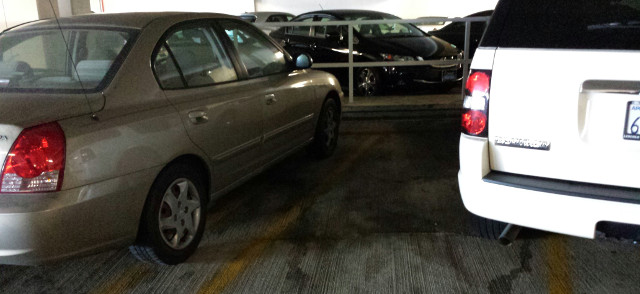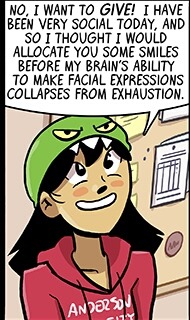
The office building where I work shares a parking garage with two other office buildings, two hotels, and an airport parking service. It can get crowded, and the spaces are so narrow and tightly packed that it’s a safe bet any given row will have two or three “open” spaces that won’t actually fit anything but a Smart car or a motorcycle, because the cars on either side are just a little bit too close to each other.
Or sometimes they’re parked at an angle into the next space, or flat-out taking up two spaces. That’s when I wish I could call them out by, I don’t know, slapping a sticker on the car that says “I’m an asshole who doesn’t know how to park.” Or starting youcantpark.tumblr.com — oh wait, someone’s done that.
It’s infuriating, especially on days like this past Friday, when I drove up and down the entire structure for half an hour looking for a spot. It took so long that my Prius shut off the electric motor due to low battery…and then turned it back on later, because all the driving on the gas motor had charged it up again.
I finally stopped at the end of a row, when two men got into a van in the last space and turned on the engine. Next to it was one of those technically-open-but-not-really spots. Behind me was another car whose driver had been following me down from the top floor, checking and discarding the same too-narrow spaces along the way. We sat there, waiting, while they sat with the engine on and the doors closed. Eventually I put my car in park, went back to talk to the guy waiting behind me, went up to talk to the guys who insisted they just needed a few more minutes before they could leave (really? they couldn’t back out, let two cars park, and find a place by the side of the aisle to let other cars by?), and just as I was about to pull over to the side so he could go around, they started backing out. I pulled into the second spot, leaving the last one clear for the car behind me.
FINALLY!
But why had it been necessary? I had passed probably 30 spaces that I could have parked in, if only the people who’d parked on either side had put in a little more effort. Obviously, people are jerks, right? They chose to park badly…but they didn’t make that choices in a vacuum.
- Narrow spaces make it tricky to begin with.
- Small errors compound as a row fills in.
- On a bad day, it gets really frustrating to find a space you can use, and when you finally do, chances are you just want to get it over with and get the hell out. On the off chance that you found two spaces next to each other, you’re not necessarily going to be thinking about whether you’ve left room for someone next to you.
Sure, people have made a lot of individual choices to park in ways that make spaces unusable…but this isn’t a problem in most parking lots. The design of the garage encourages people to park badly. I suspect that re-striping this lot to have fewer spaces per row would actually allow more cars to park here. Maybe splitting up the width of one space along the entire aisle would be enough to lessen the impact of small errors — and frustration — that often leaves them with two or three useless spaces each. That’s a net gain of one or two cars per aisle, which doesn’t sound like much, but at 2 sides × 8 lanes × 7 floors, that’s an extra hundred or so cars that could fit, with less frustration on the part of the drivers. That sounds like a win to me.

